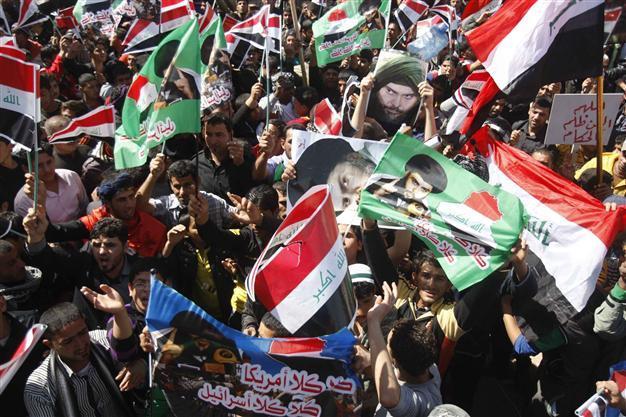44 dead as Iraq rocked by spate of attacks
BAGHDAD - Agence France-Presse

Supporters of anti-U.S. Shi'ite cleric Moqtada al-Sadr wave Iraqi flags and portraits of al-Sadr during a rally in Basra, 420 km (260 miles) southeast of Baghdad, March 19, 2012. Reuters photo
A wave of attacks Tuesday in more than a dozen Iraqi cities killed at least 44 people on the anniversary of the US-led invasion of the country, just days before Baghdad hosts a landmark Arab summit.
The violence, which left more than 180 people wounded, bore the hallmarks of Al-Qaeda, which typically attempts to launch coordinated nationwide mass-casualty bombing campaigns.
It was swiftly condemned by Iraq's parliament speaker as a bid by the jihadist group to derail this month's summit.
Officials said bombings and gun attacks rocked 13 towns and cities spanning the northern oil-rich hub of Kirkuk and the southern shrine city of Karbala from 7:00 am (0400 GMT), in the deadliest violence to strike Iraq in more than two months.
In central Baghdad, a car bomb exploded in the parking lot opposite the foreign ministry, despite dramatically heightened security measures in the capital in preparation for the March 27-29 Arab League summit.
At least three people were killed and nine wounded, officials said, underscoring concerns over Iraq's ability to maintain security for the meeting.
Parliament speaker Osama al-Nujaifi condemned Tuesday's "brutal criminal" attacks, and said they were part of efforts by Al-Qaeda to "derail the Arab summit, and keep Iraq feeling the effects of violence and destruction." Tuesday's deadliest attacks occurred in Kirkuk and Karbala, where 26 people died in total.
In ethnically-mixed Kirkuk, a car bomb targeting a police building killed 13 people and wounded 50 others, according to police Major Salam Zangana. All of the fatalities were police, as were the vast majority of those hurt.
The explosion, which was followed minutes later by a smaller car bomb, also badly damaged dozens of police cars.
"We have also received parts of bodies, but we do not know who they belong to," said Mohammed Abdullah, a doctor at Kirkuk hospital.
In Karbala, two roadside blasts at the entrance to the city killed 13 people and wounded 48, according to provincial health spokesman Jamal Mehdi.
Police spokesman Major Alaa Abbas of Karbala, which is south of Baghdad and home to the shrines of revered Shiite clerics Imam Hussein and Imam Abbas, confirmed the toll.
A car bomb in the central town of Hilla, also south of the capital, killed two people and wounded 31 others, provincial security committee chief Haidar al-Zambur said. The toll was confirmed by Ali Mohammed at Hilla hospital.
And hours before the foreign ministry attack in Baghdad, a car bomb set off by a suicide attacker in the centre of the capital killed four people and wounded eight, security and medical officials said.
An early-morning gun attack on a west Baghdad church also left three police dead, church and security officials said.
Another car bomb in Ramadi, capital of western Anbar province, killed two people and wounded 11, according to police and medics. A roadside bomb blast later in the city targeting Anbar governor Qassim Mohammed Abed left two wounded, though Abed was unharmed.
Separate gun and bomb attacks in Salaheddin province killed four people, including a city councillor, police said.
Bombings in the main northern city of Mosul, the refinery town of Baiji, and the northern towns of Baquba, Daquq and Al-Dhuluiyah left 25 people wounded. Another car bomb in the northern city of Samarra left no casualties.
Tuesday's violence was Iraq's deadliest day since January 14, when 53 people were killed in a suicide bombing outside the southern port of Basra.
The attacks come on the ninth anniversary of the beginning of the US-led invasion of Iraq which ousted Saddam Hussein, and just days before Baghdad hosts an Arab League summit, the first meeting of the 22-nation body to be held in the capital since Saddam's 1990 invasion of Kuwait.
Officials insist Iraq's forces are capable of maintaining security for the summit, but admit they may need to effectively shut down Baghdad to do so.
Following the February 23 violence, officials said Al-Qaeda is bent on derailing the summit in an attempt to stoke instability in Iraq to give it further room to operate.
Violence across the country is down from its peak in 2006 and 2007, but attacks remain common. A total of 150 Iraqis were killed in February, according to official figures.
